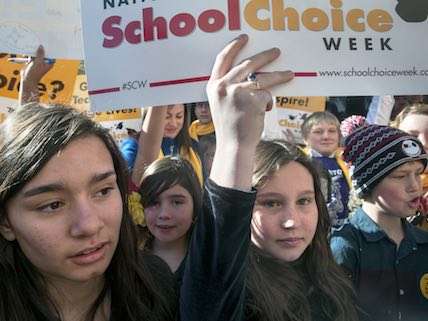Why Millennials Could Become the School Choice Generation
When advocates make clear that school choice is about liberating kids from their zip codes, the message resonates.


Millennials could become the school choice generation—but advocates still have a lot of work to do.
According to a survey released by EdChoice in October, millennials are more in favor of many kinds of school choice reform—charter schools, voucher programs—than older Americans, but only when they are educated about these programs.
Overall, 63 percent of millennial respondents were in favor of charter schools, and just 19 percent were opposed. The national average was 59 percent and 23 percent. This means that millennials were actually slightly more pro-charter than the average, though the difference is within the survey's margin of error.
That should be reason enough for school choice reformers to cheer, though some caution is still warranted: millennials held initially hostile views toward vouchers—just 33 percent supported them. But the survey asked the question twice: after it explained what vouchers were, support for them rose to 61 percent.
These results don't surprise me, because school choice reflects an important philosophy of millennials: that people deserve more choice and control over their own lives. Of course the generation that thinks Facebook should list 58 different gender options wouldn't be content with a non-choice paradigm for U.S. schools. Compared to older Americans, millennials are less likely to feel bound to follow tradition and stick to a set plan—they're more likely to move across the country, think outside the two-party system, and get their news from something other than cable. They're also more skeptical of the idea that the government restrictions on immigration are justified.
Philosophically, immigration is a lot like school choice. It's wrong for the government to force people to confine their activities to the place where they were born, and it's similarly wrong for the government to force kids to attend the school associated with the place where they were born.
When advocates make clear that school choice is about liberating kids from their zip codes, the message resonates with millennials.
National School Choice Week, an annual event promoting the ability of parents and students to have greater options in K-12 education, starts today. Over 21,000 events involving almost 17,000 schools from all 50 states will take place over the coming days. Go here to get more information about events and data about how increasing school choice--charters, vouchers, educational savings accounts, and more--is one of the best ways to improve education for all Americans. As a proud media sponsor of National School Choice Week, Reason will be publishing daily articles, podcasts, videos, interviews, and other coverage exploring the ways in which education is being radically altered and made better by letting more people have more choices when it comes to learning. For a constantly updated list of stories, go to Reason's archive page on "school choice."


Show Comments (164)